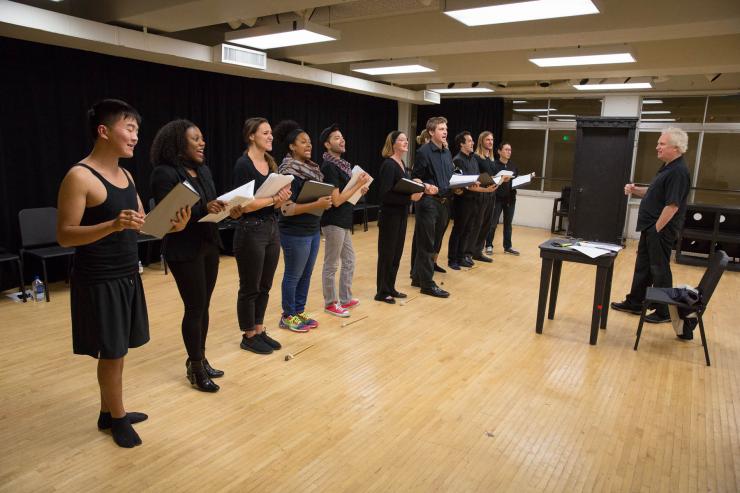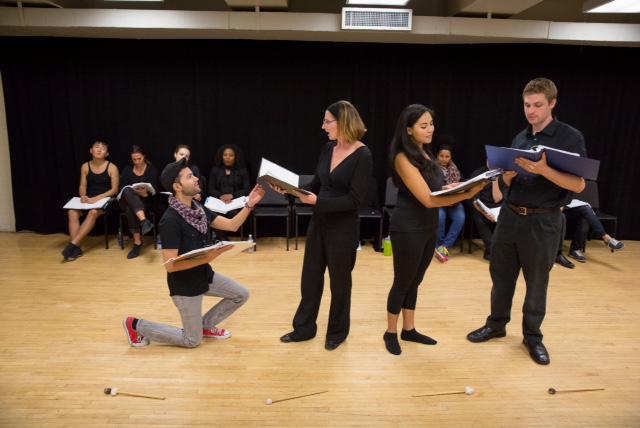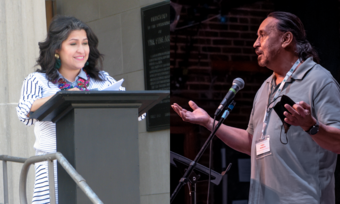Diversifying the Classical Canon
In recent years, theatres across the United States have announced a strong commitment to greater diversity in their personnel. More people of color on stage and behind the scenes—this is all for the good. Yet there has been no corresponding diversification of the plays we turn to when we want the classic, the tried and true. Instead, we have a largely undiluted diet of Shakespeare, Shakespeare, and more Shakespeare, with the occasional nod to the Greeks. Particularly given the US population today, could we not envision instead a turn to the vibrant tradition of Hispanic classical theatre? The lively comedia—the theatrical corpus developed on both sides of the Atlantic by playwrights such as Spaniards Félix Lope de Vega and Pedro Calderón de la Barca, or Mexicans Juan Ruiz de Alarcón and Sor Juana Inés de la Cruz—should not remain in the wings. As it moves center stage, it could show not just Latino audiences but all theatregoers that the classics come in different flavors.
Given the US population today, could we not turn to the vibrant tradition of Hispanic classical theatre?
Why should this seem so hard? In part, because Shakespeare has been granted exceptional powers—what other playwright could stave off the invading hordes, as Shakespeareans at the turn of the twentieth century promised, or suture together the nation, as the more recent NEA projects to present Shakespeare in all fifty states optimistically imply? Despite the fact that the Shakespeare-US connection is a willed fantasy, and that the playwright is certainly no more native than any other European in the New World, Shakespeare is treated as a national property and a given for US audiences.
Meanwhile, even four hundred years after the time of Shakespeare and Cervantes, Spain is still considered somehow different. Exotic, too religious, obsessed with honor—isn’t Spain, and particularly the Spain of the Golden Age, all of those things? Well, yes and no: around a thousand Hispanic classical plays survive, over four hundred by Lope de Vega alone (compare to Shax’s thirty-eight, or, better yet, don’t compare, just go read some). This makes it very difficult to categorize them all as any one thing. But generations of Anglo-American critics knew what they were looking for in Spanish theatre, and, no great surprise, found exactly what they expected to find: plots obsessed with honor and the defense of sexual virtue, plays in which wives were murdered to preserve their husbands’ reputations even if they had done nothing wrong. Great theatre, to be sure, but neither exactly uplifting nor in line with current mores. The otherness of Calderón’s “wife-murder plays,” as they are known, might well give a director pause. A play such as Lope de Vega’s Fuenteovejuna, for its part, involves villagers avenging the sexual wrongs done by their overlords, and so speaks more readily to contemporary audiences, but even its relative popularity is the exception that proves the rule.

When one steps back from the Anglo-wish-fulfillment canon of honor and violence, however, it turns out that many Spanish comedias are witty, urbane, self-aware, and intensely concerned with the theatricality of life in the big city. These were plays for the people: performances took place in open-air theatres, where audiences of all classes and both sexes commingled. Many comedias are sophisticated urban dramas, offering pointed reflections on the constructed nature of class and gender as well as the social role-playing required by life in the city. They often feature women on top, and include fantastic female roles. Consumed with the problem of how to represent oneself to the best advantage, comedias are skeptical about essences or absolutes. As in Cervantes’s masterful interlude, El retablo de las maravillas/The Marvelous Puppet Show, they peer behind the armature of the system and cry, “The emperor has no honor!”
Yet acknowledging these plays is not enough: theatre practitioners need to know that they can find guidance when approaching a corpus that is far less familiar than Shakespeare, and potentially overwhelming due to its very size. Which plays make sense for modern audiences? How does one go about finding a translation, or the best translation? Are there translations aimed at performance? How might the plays be adapted or reconfigured? What additional support does an audience need when encountering them instead of yet another version of Shakespeare?
Our broader goal is to foster awareness and appreciation of Hispanic classical theatre in Los Angeles and beyond. We hope to reach theatre professionals across the US, offering them the materials and tools to explore the rich tradition of the comedia.
At UCLA, we’ve launched the open-access Diversifying the Classics project to address precisely these questions. Our broader goal is to foster awareness and appreciation of Hispanic classical theatre in Los Angeles and beyond. We hope to reach theatre professionals across the US, offering them the materials and tools to explore the rich tradition of the comedia. Our first—and ongoing—initiative is Golden Tongues, a festival of adaptations of Hispanic classical theatre to contemporary Los Angeles, by Los Angeles playwrights. In collaboration with Playwrights’ Arena, Golden Tongues has so far commissioned eight new plays by Luis Alfaro, Velina Hasu Houston, Boni Alvarez, and others, presented in staged readings at the UCLA Clark Library in West Adams and on the UCLA campus. Alfaro’s Painting in Red was also produced by Playwrights’ Arena in fall 2014. Golden Tongues helps introduce audiences to the comedia and its concerns, while proving that classical theatre need not be antithetical to new work: each nourishes the other. A fourth installment will be presented at the Clark Library in September 2016.
At the heart of Diversifying the Classics is our translation workshop, in which scholars, students, and actors generate at least one new, previously untranslated play a year, in versions specifically geared for performance. These translations are posted on the website, in a facing-page edition with the original Spanish, with an introduction and annotations, and are free for anyone to use. We select plays that we consider particularly relevant and attractive for modern companies and modern audiences.

Our first effort was Guillén de Castro’s The Force of Habit, a poignant exploration of whether gender can be learned or unlearned. Félix and Hipólita, two siblings separated at birth, are brought up in the habits of the opposite gender. Kept close by his mother’s side, Félix is timid and sensitive. Hipólita, trained by her father on the battlefield, is fiercely attached to her sword. When the family is reunited, the father insists on making the siblings conform to traditional roles. Helped along the way by their respective love interests, the two gradually assume the expected positions, but their journeys expose the limitations of the gender system.
We next translated Lope de Vega’s A Wild Night in Toledo. In Spanish popular culture, “una noche toledana” is a long and sleepless night of wild, often amorous intrigues, or of unrelenting annoyances. In this funny, fast-moving play, young men and women cross paths at a hostel in a single night. Under the covers of darkness and disguise, they use ingenuity and humor to navigate personal desires, negotiate collective frustrations, and test whether they can rewrite their destinies alongside their identities.
Also on our site is my forthcoming translation of Lope de Vega’s Women and Servants, recently rediscovered in Madrid’s National Library. The comedia emerges from its four-hundred-year sleep with a remarkable freshness: it presents a world of suave dissimulation and accommodation, where creaky notions of honor and vengeance have virtually no place. Lope de Vega depicts a sophisticated urban culture of self-fashioning and social mobility, as sisters Luciana and Violante outsmart fathers and masters to marry those they love. The women prefer the men they choose to those of higher standing, and are more than capable of getting their way.
We are currently working on Mexican writer Juan Ruiz de Alarcón’s Leading with a Lie. In the Madrid he imagines, a foreign suitor can wreak havoc with preexisting alliances. Urbanity and urban space are at the heart of this play: how do you sort out your affections when the women you court live literally on top of each other, in a house with multiple stories? Parents remain offstage as sons and daughters must figure out their obligations to each other and to who they are, or at least who they say they are. And Veronica Wilson and Laura Muñoz, two members of the workshop, are putting the finishing touches on their translation of Guillén de Castro’s Mismatched in Valencia, an amazingly modern and biting comedy on what happens after the traditional happy ending. Two married couples air their disillusion with marriage, while the cross-dressed mistress of one of the husbands merrily manipulates one and all. With everyone attracted to the wrong person, innuendo, accusations, and revenge steal the show.
Beyond the translations, Diversifying the Classics aims to make the Hispanic classical corpus more familiar, lowering the bar for theatre professionals and audiences alike to acquaint themselves with this rich repertoire. In partnership with 24th Street Theater and About… Productions in Los Angeles, we are exploring how the comedia might be taught in schools, to develop an audience among the next generation. Curricula are open-access and posted on our site as available. An anthology of monologues for actors is forthcoming from Smith & Kraus in 2017, so that actors and directors may access the plays for training and auditions. The working title is 90 Monologues from Spanish Classical Theater.
Though Shakespeare, like his own Cleopatra, may never stale, US audiences deserve access to the fresh and surprising corpus of Hispanic classical theatre. Trust us, it won’t disappoint.










Comments
The article is just the start of the conversation—we want to know what you think about this subject, too! HowlRound is a space for knowledge-sharing, and we welcome spirited, thoughtful, and on-topic dialogue. Find our full comments policy here
Interesting article. Congratulations on the project. A few observations:
1) It's a little disingenuous to describe the comedia as "developed on both sides of the Atlantic." Yes, Alarcón was born in Mexico, but he lived his adult life, including the period of his playwriting, in Spain. Sor Juana is an exception, but a single exception only proves the rule. In terms of the comedia, Sor Juana was a "follower," not a "developer" or innovator, and her works came far past the prime of the genre. (I am not speaking to her poetry or prose, which are rightly recognized as exceptional.)
2) The Shakespeare inferiority complex on display in this article is embarrassing. Shakespeare has not been "granted exceptional powers." He has *earned* exceptional powers by writing a canon of 38 plays that has withstood the test of time like no other. Whining about "diversification" will not change that. Nor is it a sign of superiority that Spanish playwrights wrote more plays than Shakespeare did. Quantity does not equal quality. Nothing in the entire Spanish comedia, with the possible single exception of Segismundo, can come close to the depth and complexity of Lear, Hamlet, Lady Macbeth, Viola, Prospero, or Falstaff, to name only a few. The bottom line is that building up the comedia should not require tearing down Shakespeare. Contemporary theater has room for both.
3) It's interesting that the comedia's most famous export, Don Juan, was popularized by non-Spanish writers. It's worth asking why that is the case.
I am thrilled to read about this and want to read all of these new translations asap! However, be careful about your blanket assertions-- many of us have been doing classics outside of the Shakespeare canon for years, in new translations and with great success. ACT just did the great Chinese epic THE ORPHAN OF ZHAO and is in the midst of working with Melinda Lopez and Melia Bensussen on Lorca's YERMA and well as with Domenique Lozano on Schiller's DON CARLOS. For me, the issue is not lack of appetite, but lack of funding for classical work of any stripe. It is simply not considered important in an American theater obsessed with new contemporary American plays. But a rich theater ecology, as you so beautifully note, should be made up on new work and of brilliant unusual works from the past in constant dialogue with each other. Look at the shoulders we stand on!
Brava! And if you do research of some of the US' longest theater publications you will find the bias you mention in the neon lights of general absence. I did this research and was stunned. one or two critical essays of Spanish classical plays in 3 decades. The US has a long standing bias of looking towards European theater, and only certain countries at that. The US mainstream academia seldom, if ever, look south of its borders or to anything Hispanic as classical.
I agree enthusiastically. It seems to me, after fifty years of reading plays of the world repertoire, that Calderon is one of the rare playwrights who can be placed in the same room as Shakespeare. His talents as tragedian and comic playwright are comparable to Shakespeare. deVega - with some exceptions in his very many works available in translation - wrote plays worthy of our deep admiration. Of the modern playwrights, Lorca too often overshadows others of comparable worthiness, such as Benavente, whose "The Bonds of Interest" and "La Malquerida" are only two of his many notable works.